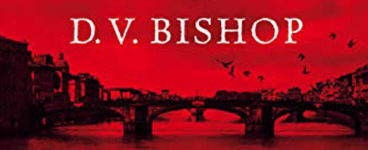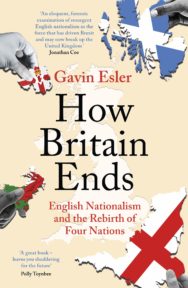‘This is a consistently thought-provoking and well-argued book, and yet the more I read it, the more I wondered about English nationalism.’
The future of the union is a subject that will continue to dominate British political discourse throughout the year. David Robinson finds that Gavin Esler’s new book, How Britain Ends, sheds light on how we arrived at our current circumstances and what it may mean in the months and years ahead.
How Britain Ends: English Nationalism and the Rebirth of Four Nations
By Gavin Esler
Published by Head of Zeus
The best bit of Gavin Esler’s latest book is when he gets to grips with Shakespeare. The thesis of How Britain Ends is that it’s Brexit-fuelled English nationalism, rather than the SNP, that will consign what Gordon Brown last month called ‘the world’s most successful experiment in multinational living’ to the rubbish bin of history. You can’t talk about English nationalism without at some stage coming across that speech from Richard II, Act II – you know, the one about ‘this happy breed of men’, ‘this sceptred isle’, ‘this fortress built by Nature for herself against infection’ (ouch), ‘this blessed plot, this earth, this realm, this England’ – and Esler’s analysis of it is one of the highlights of his book.
The speech by John of Gaunt is, he says, is ‘one of the most beautifully patriotic found anywhere in literature’, capable of sending shivers up even a Scottish spine. But if you read it right to the end – and I must admit, I never have – its meaning changes. This once-happy land, it concludes, ‘is now leased out … like to a tenement or a pelting farm…’ and ‘This England that was wont to conquer others/Hath made a shameful conquest of itself.’
What else, Remainers like Esler argue, was Brexit? And even if you don’t accept that, look at the speech’s tone. John of Gaunt is emphatically not looking forward to new and exciting developments in the sceptred isle: just the opposite, he is looking back to a time when England was a far more contented place. This ‘nostalgic pessimism’ is, Esler suggests, inherent in almost all writing about Englishness and probably played its part in the 2016 Brexit referendum too. The EU didn’t really matter to most voters – in a survey the previous year only 6 per cent rated it as a touchstone issue – and the complexities of trade tariffs engaged even fewer. But given the chance to have their say, nostalgic pessimism kicked in, and English nationalists kicked the UK out of Europe. And, argues Esler, unless they are ready to accept root-and-branch constitutional reform, they’ve made the break-up of Britain inevitable too.
It’s the English not the Scots, who are swinging the sledgehammer here – or, in Fintan O’Toole’s phrase, ‘practising a form of silent secession from the UK’. Of course, they wouldn’t see it like that: Prime Minister Johnson furtively headed north last month to ‘save the Union’ not destroy it. But ‘getting Brexit done’, the one clear demand of the English nationalists, made this impossible. Taking away Scots’ European identity against their will in the Brexit referendum has made Scottishness more important, not less. To the true Brexiter, this was a price worth paying. In October 2019, Tory pollster Lord Ashcroft found that 76 per cent of Tory Leave voters wanted to push for Brexit even if it meant Scotland gaining independence. Slightly fewer – 74 per cent – thought that Brexit would be worth the sacrifice of Northern Ireland.
To anyone who thinks of themselves as British, those figures are hideous. If Unionists no longer care about the Union, says Esler, ‘the end of Britain is only a matter of time’.
But let’s drill down a bit deeper into Ashcroft’s polling sample. Surely the whole point about those people who didn’t set much store the Union is that they didn’t think of themselves as British in the first place. Nominally, of course, they were: and they wanted the dark blue passport to prove it. But in their heads they weren’t really Brits at all. They were English.
Esler calls these people English nationalists, and so far in this piece I have too. His thesis is that the Conservative party, which has now remodelled itself in the image of UKIP, has taken the UK to the point where it faces three possible futures. The first option, to reinvent Britishness, is unlikely to succeed because the things that made Britain work in the past now no longer do. The second is a form of federalism with a written constitution – basically, a reworking of the ‘Home Rule All Round’ plans from the 1890s that would incorporate much of Salmond’s 2014 independence plan. The final option – doing nothing – may well be the most likely, given the incompetence of the current British government, but would lead to an even more divisive break-up of the UK. Already, he notes, ‘Johnson has done more in a few months to bring about a United Ireland than the IRA managed in three decades of bombings and shootings’. If denied indyref2, Scots will become ‘even more scunnered, thrawn and determined to seek a more extreme form of independence’. The Great Paradox of Brexit – that a mainly English whim to assert independence from the EU could lead to Scotland and Northern Ireland demanding independence from England itself – could soon be complete.
This is a consistently thought-provoking and well-argued book, and yet the more I read it, the more I wondered about English nationalism. Maybe that’s because though I was born in England myself, I’ve never felt its pull. Britishness, yes; Scottishness too. Like everyone else, I’ve noticed how the cross of St George has gradually replaced the Union Jack south of the Border, but if this is a rising tide of millions, a force strong enough to fragment a country, where is its cultural expression? Where are the films clips from the Noughties onwards that you’d use to illustrate the thesis? Where are the books?
Esler is, however, right about one aspect of English nationalism: it is comparatively unexplored. If it does exist, it’s hidden away in the statistics, in the rising number of people who identify as English rather than British in recent censuses. According to the Institute of Public Policy Research, there’s a discernible sense of resentment among their English – especially in the North, home to all of the UK’s fastest declining towns with populations bigger than 100,000 – that Scots have greater political clout and get comparatively more money from the public purse. But that IPPR report was written in 2012, and if there have been any mass demos in favour of an England-only parliament since then, I must have missed them.
So was Brexit proof of rising English nationalism or just a loopy protest vote? I’ll leave that for you to decide, but first I’ll take you back to Shakespeare. What I love most of all about the John of Gaunt speech, that classic statement of English exceptionalism, is the man making it. For John of Gaunt, the Duke of Lancaster, is really Jean de Ghent. Or, as we would say these days, now that his own country has come into being, a Belgian.
How Britain Ends: English Nationalism and the Rebirth of Four Nations by Gavin Esler is published by Head of Zeus, priced £14.99.
ALSO IN THIS ISSUE

 Happy Birthday, Lanark
Happy Birthday, Lanark
‘Glasgow is a magnificent city,’ said McAlpin. ‘Why do we hardly ever notice that?’

 City of Vengeance
City of Vengeance
‘Instead of writing, I thought about his character. Who he was, how he was able to move between all …













